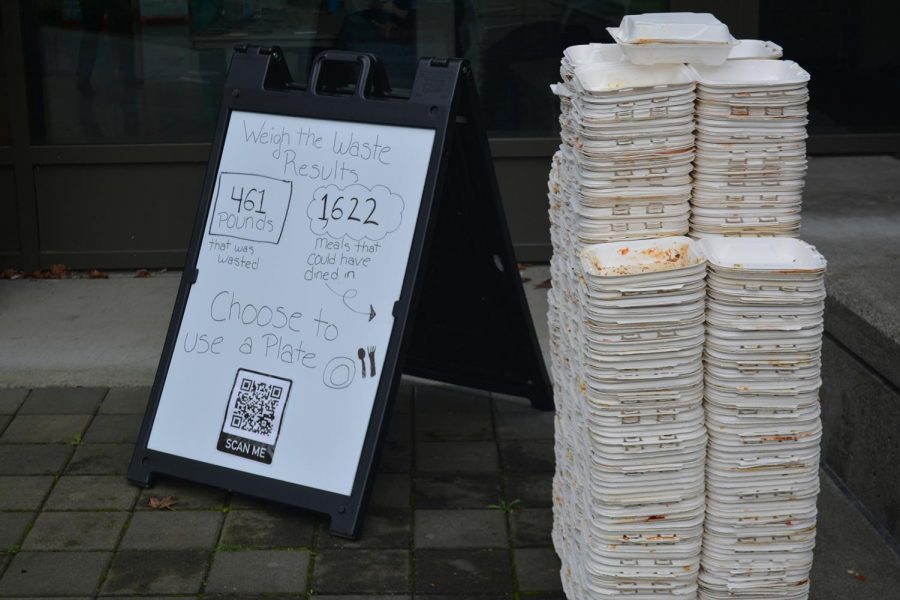New Changes to Recyclemania Hope to Decrease Campus Footprint
During the Weight the Waste event at C-street, volunteers weighed 461 pounds of food waste and counted 1,622 take-out boxes.
As strange as it can feel to hand your unfinished meal or empty to-go box to someone in the cafeteria, these are just some of the little things that Recyclemania, and the people behind it, are doing to make people more conscious of their waste. Seattle University is participating in its fourth annual Recyclemania with efforts to be a more sustainable campus—this time with a bigger focus on food sustainability and waste diversion.
Taking place over two and a half months, Recyclemania includes a series of events to try and get the campus involved in becoming more environmentally-friendly. This is part of the national competition of Recyclemania, in which schools across the country compete in different events in an attempt to have the lowest amount of different types of waste.
Last year, Recyclemania occurred at the same time as a school-wide effort to reduce recycling contamination in order to prevent all of the university’s recycling going to the landfill, so Recylemania wasn’t the main focus for the year.
For this year’s competition, the school is starting something different. With a new team to help, the school will be competing in more events than it ever has before, including a competition on food waste.
Nathan Wolk, the campus recycling coordinator in the facilities department, said this year’s goal includes participation in the electronic waste (e-waste) recycling and in weighing the school’s exact amount of food waste.
“We’ve struggled with some contamination issues, with different plastics and e-waste so that was a big focus for us,” Wolk said. “We’ve really done a strong push to do a lot of education around specific items that are problem areas.”
Recyclemania brings together a lot of different people from around campus to get the wheels moving on a massive undertaking. There are people from different departments, such as the Center for Environmental Justice and Sustainability (CEJS) and Facilities, as well as students from multiple organizations such as the Green Team and interns working with organizations such as Athletics and Chartwells.
Rachel House, a second-year environmental studies major and a Zero Waste Intern in the facilities department, emphasized the importance of working with many groups on campus to teach students about food waste.
“There are students here that aren’t used to the whole composting system that we have in Seattle,” House said. “For students who didn’t have anything like it, we are trying to be there to teach them how to throw things out properly.”
This is not just a temporary project, says Yolanda Cieters, the sustainability manager in the CEJS. Recyclemania raises awareness for these issues on campus and helps inform people of what they can be doing the rest of the year.
“The real purpose of the whole competition is to raise awareness for the problems on campus, not as an immediate solution,” Cieters said. “There is so much more that people could be doing the rest of the year, and there are lots of resources on our website.”
Recyclemania is a part of the school’s goal to decrease food waste and raise awareness about food insecurity. The school’s waste diversion program is trying to improve over the coming years, including a goal to have 80% of the waste that the school produces be diverted away from landfills by 2020. The school’s waste diversion from last year was 67.7%, and it is through educational programs like Recyclemania that the school hopes to increase these figures.
Taylor McKenzie, a second-year environmental studies and women and gender studies double major and Redhawk food recovery intern, spoke to the importance of remembering to conserve the food that we have and to take steps to make sure that that food doesn’t go to waste.
“There are people in this country, and even on campus, that aren’t getting the food they need, which is crazy because we have more than enough food production,” McKenzie said. “We have enough food to make sure that everyone gets affordable food consistently. We just need to change the food networks that we have to get all the wasted food to where it needs to be.”
Some of the events may have already passed, but the competition isn’t over, as Seattle U will hold a zero waste teaching kitchen held in conjunction with Chartwells and a zero-waste basketball game with the Athletics Department. To finish off the week, there will also be a public weigh-in of the school’s waste for the competition.


